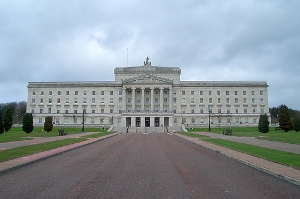 Examining the failure of early attempts to end Northern Ireland’s troubles, Michael Kerr draws on new research to present two contrasting approaches to British policy in Northern Ireland and the complexities of applying consociational democracy to a divided society where the external parties to the conflict lack the political power or will to implement and police it.
Examining the failure of early attempts to end Northern Ireland’s troubles, Michael Kerr draws on new research to present two contrasting approaches to British policy in Northern Ireland and the complexities of applying consociational democracy to a divided society where the external parties to the conflict lack the political power or will to implement and police it.
In 1973, Northern Ireland’s first Secretary of State, William Whitelaw, convinced rival unionist and nationalist leaders, such as former Unionist Prime Minister Brian Faulkner and SDLP negotiator John Hume, to set aside irreconcilable differences and form a power-sharing executive at Stormont. Having prorogued the Stormont parliament in March 1972, British Prime Minister Edward Heath set Whitelaw the unenviable task of ending direct rule through the imposition of a form of government that would ensure that Northern Ireland was never again administered by a party that drew its support virtually or entirely from one side of Northern Ireland’s divided society.

In January 1974, Ulster unionist and Irish nationalist opponents crossed the sectarian divide and formed a power-sharing government at Stormont. The Northern Ireland executive was short-lived however, following foul to a mistimed Westminster general election in February 1974, which Heath lost, and a very un-British coup in May that same year.
The opponents of the Conservative government’s Northern Ireland policy – the republican and loyalist paramilitary organisations and the unionist parties who were not central to Whitelaw’s plans – had set out to remove mandatory power-sharing from the constitutional options that would be open to Northern Ireland if the executive collapsed. And they succeeded in this endeavour, when British Prime Minister Harold Wilson failed to protect the executive from an unconstitutional political strike.
It was the first time since the Second World War that there had been a significant threat to constitutional government in the United Kingdom. An Ulster Workers’ Council (UWC) became the focal point for opposition to political reform from within the largely Protestant unionist community. It successfully challenged the authority of the Westminster parliament to determine the form of government that Northern Ireland would have. Taking control of Northern Ireland’s power stations, and bringing the province to the brink of political and economic meltdown through the imposition of a general strike, the UWC undermined the capacity of the Stormont and Westminster administrations to govern the province.
Ignoring calls from the Northern Ireland executive to break the strike in its first days, Wilson offered no militarily challenge to the Protestant paramilitary groups that were aligned against it; for had he done so, the British Army might have been exposed to the venom of both communities in Northern Ireland. In failing to uphold its constitutional government, Wilson was rejecting Heath’s idea that the British could or should provide a solution to Ireland’s ancient troubles, either by imposing power-sharing or through some other form of direct rule from Westminster.
The question each participant asked themselves as Northern Ireland’s first peace process unfolded is of relevance to societies which may experience civil war, revolution or insurgency in the future: in what order did the Heath and Wilson governments decide to abandon the political status quo in Northern Ireland and what political risks were they prepared to take to impose a new order? The contrasting approaches towards the use of power-sharing in Northern Ireland, taken by the Heath and Wilson governments in the 1970s, offers a compelling example of the complexities of applying consociational democracy to a divided society in which there is no consensus over what the objective of power-sharing is, and where the external parties to the conflict lack the political power or the political will to implement and police it.
While viewing Irish unity as being in the long-term interest of Britain, Heath’s interpretation of how his government should meet its constitutional obligations to Northern Ireland was premised on the reality that it had to resolve or regulate its troubles. Heath simply did not have the political power to implement the policies that Whitelaw constructed in accordance with this interpretation. Wilson took an altogether different view of Anglo-Irish relations. He set out to dispel Heath’s notion that the British government could or should remain responsible for Northern Ireland’s troubles. He believed that the conflict should be resolved, one way or another, by the Irish parties to it. Although Whitelaw’s power-sharing settlement had the potential to successfully reduce and regulate political violence in Northern Ireland, Heath’s successor was more inclined to push Northern Ireland towards independence or dominion status.
Once the idea of mandatory power-sharing had been finally quashed, Whitelaw’s policies remained largely redundant until Tony Blair swept to power with a huge majority in 1997. The 1998 Belfast Agreement was constructed out of the façade of the Whitelaw settlement. Only this time, the British and Irish government had similar views towards the value of the policy of applying power-sharing to Northern Ireland. In 1972 Heath viewed power-sharing as the device by which he might restore order in Northern Ireland and swiftly end direct rule. The Irish government viewed it as the device that would force Northern Ireland’s unionist community into a united Ireland in the short to medium term through powerful all-Ireland bodies.
By the late 1990s however, both governments had come to view power-sharing as the most realistic means of regulating ethno-national divisions in Northern Ireland, and they worked with a unity of purpose to implement and police that vision. The result: Northern Ireland is today more comfortable in its UK skin than at any time since partition and Ireland is more united than at any point in contemporary Anglo-Irish history.
Michael Kerr will be launching his book, The Destructors: The Story of Northern Ireland’s Lost Peace Process, on 7 June at King’s College, London.
Please read our comments policy before commenting.





